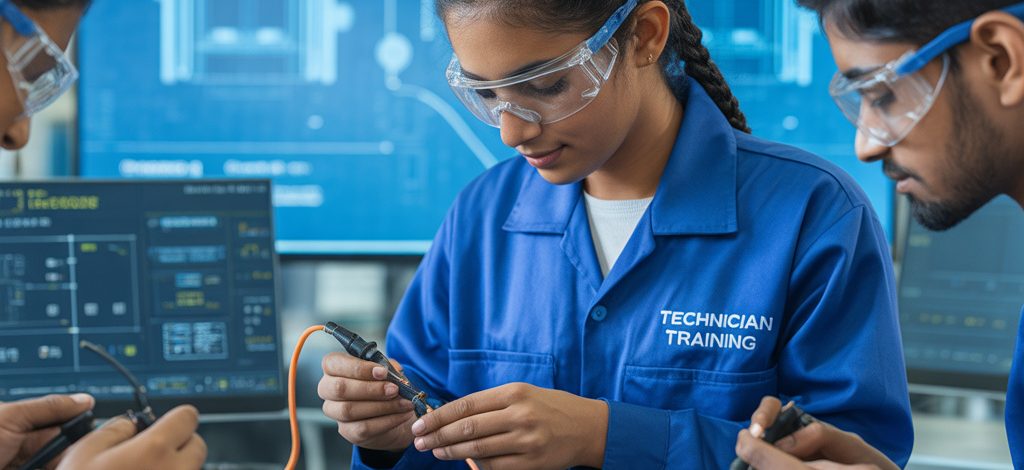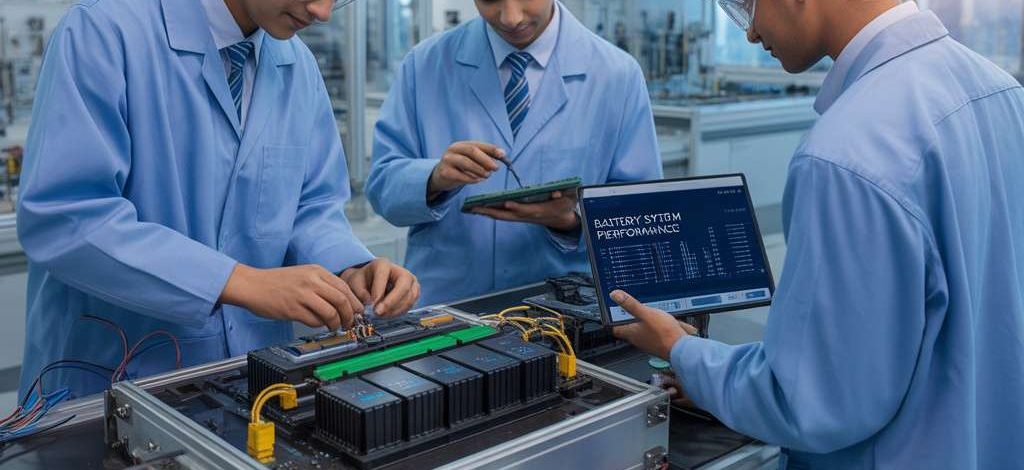Battery Systems Technician Course
The Battery Systems Technician Course is designed to provide practical knowledge and hands-on skills in working with modern battery technologies. It covers battery types, construction, charging and discharging principles, safety practices, monitoring, and basic troubleshooting. Through real-world examples and lab-based training, learners gain experience in maintaining and handling battery systems used in electric vehicles, renewable energy storage, and industrial applications. This course prepares participants for technical roles supporting the rapidly growing battery and clean energy sectors.
- 72 Hours (2 hours/day x 6 days/week x 6 weeks) OR at your own pace
- Hindi, English
- Learn & Get Certified
- Basic & Intermediate
- Hands-On Training


Online Course Fees
Offline Course Fees
About this course
The Battery Systems Technician Course is a 72-hour practical training program.
It is designed to equip learners with the technical skills required to assemble, test, troubleshoot, and maintain battery systems used in electric vehicles (EVs), solar storage, UPS systems, and energy backup applications. The course covers battery chemistry fundamentals, pack construction, BMS operation, safety protocols, and diagnostic workflows, enabling participants to work confidently with modern lithium-ion and advanced battery technologies.
Through structured modules, participants learn:
– Battery fundamentals: Li-ion, LFP, NMC, lead-acid, and emerging chemistries
– Cell structure, ratings, C-rate, SoC/SoH concepts, and charge–discharge behavior
– Battery pack assembly: series/parallel configuration, busbars, welding methods
– Battery Management System (BMS): protection functions, balancing, communication
– Battery chargers, connectors, fuses, relays, and safety circuitry
– Thermal management, insulation, and enclosure design basics
– Common battery faults: cell imbalance, overvoltage/undervoltage, high temperature, BMS lockout
– Diagnostic tools: multimeter, cell testers, impedance meters, IR thermometers, CAN-based diagnostics (intro)
-Troubleshooting techniques and repair workflows
– Safety protocols, handling guidelines, and emergency response practices
Hands-on training includes cell testing, pack inspection, BMS configuration, identifying faulty cells, balancing procedures, thermal checks, connector repair, and assembling small battery modules with proper safety compliance.
By the end of the program, participants are prepared to:
– assemble and maintain battery packs for EVs and energy systems,
– diagnose and repair battery-related faults using professional tools, and
– work as Battery Systems Technicians, EV Battery Technicians, or Energy Storage Maintenance Technicians in EV service centers, battery manufacturing units, and renewable energy projects.
This course provides essential knowledge and practical training to build industry-relevant skills.
- Online Course Fees: ₹3500, ₹2500 (incl. GST) (Excluding tools & equipment cost)
- Offline Course Fees: ₹13500, ₹12000 (incl. GST) (Excluding tools & equipment cost)
- Certification: TCoE
- Duration: 72 Hours (2 hours/day x 6 days/week x 6 weeks) OR at your own pace
What you'll learn
After this course you will learn:
- Basics of EV Battery Technology: Understand the role and importance of batteries in electric vehicles.
- Battery Chemistry and Cell Design: Learn about lithium-ion, solid-state, and other battery types used in EVs.
- Battery Pack Configuration: Explore how individual cells are connected to form modules and complete battery packs.
- Battery Management System (BMS): Study how BMS monitors, protects, and optimizes battery performance.
- Thermal Management Techniques: Learn methods to maintain safe battery temperature and prevent overheating.
- Battery Charging and Discharging: Understand charging principles, fast-charging systems, and safety protocols.
- Battery Testing and Diagnostics: Gain practical skills in detecting, analyzing, and troubleshooting battery faults.Learn how to identify and navigate different airspace classifications to fly safely and legally.
- Battery Life, Safety, and Recycling: Explore battery degradation factors, safety standards, and sustainable recycling methods.
Course Content
Why take this course?
This course equips you with practical skills to handle, maintain, and troubleshoot battery systems used in electric vehicles, renewable energy storage, and industrial applications. You will learn about battery types, charging and discharging protocols, safety practices, fault detection, and preventive maintenance. With the growing reliance on batteries for clean energy and electric mobility, skilled battery technicians are in high demand. This course prepares you for hands-on, job-ready roles in EV workshops, energy storage projects, and manufacturing, ensuring safe and efficient battery system operations.
How to use online TCoE platform?
Tools and Equipment required
National Skill Development Mission
Module-1: Introduction of Batteries
- This module introduces learners to the fundamentals of batteries used in electric systems, focusing on their types, construction, capacity, voltage, and performance characteristics.
- It covers how batteries store and deliver energy to motors and controllers, as well as key considerations such as efficiency, safety, and lifespan.
- Understanding battery fundamentals equips students with the knowledge to select, operate, and maintain power sources for motor-controller systems effectively.
Module-2: Battery Market
- This module provides an overview of the global and regional battery markets, with a focus on applications in electric vehicles and motor-controller systems.
- It covers market trends, key battery technologies, major manufacturers, and emerging innovations.
- Learners will gain insights into the demand for different battery types, pricing factors, and future opportunities, helping them understand the commercial and technological landscape that drives motor and controller development.
Module-3: Introduction of equipment and tools used
- This module familiarizes learners with the essential tools and equipment required for working with motors, controllers, and their associated electrical systems.
- It covers hand tools, multimeters, oscilloscopes, power analyzers, torque meters, soldering tools, and safety equipment.
- Students will learn proper handling, usage, and maintenance of these tools, building a strong foundation for hands-on assembly, testing, and troubleshooting of motor-controller systems.
Module-4: Cell Fundamentals
- This module introduces learners to the fundamental concepts of electrochemical cells, the building blocks of batteries used in motor-controller systems.
- It covers cell types, construction, voltage, capacity, energy density, and charging-discharging principles.
- Understanding cell fundamentals equips students with the knowledge to design, select, and integrate battery cells effectively for powering motors and controllers in various applications.
Module-5: Battery Pack Design Basics
- This module introduces learners to the principles of designing battery packs for motor-controller systems.
- It covers series and parallel cell configurations, voltage and capacity calculations, thermal management, and safety considerations.
- Students will learn how to assemble efficient and reliable battery packs that provide the required power and energy for motors, ensuring optimal performance and longevity of motor-controller applications.
Module-6: Battery Pack Assembly
- This module guides learners through the practical process of assembling battery packs for motor-controller systems.
- It covers arranging cells in series and parallel, connecting battery management systems (BMS), ensuring secure wiring, and applying safety precautions during assembly.
- Emphasis is placed on accuracy, reliability, and testing, enabling students to build functional battery packs that safely deliver power to motors and controllers.
Module-7: Battery Pack Testing and Possible Faults
- This module focuses on evaluating the performance and reliability of battery packs used in motor-controller systems.
- Learners will explore methods to test voltage, current, capacity, and overall functionality, as well as identify common faults such as cell imbalance, short circuits, and connectivity issues.
- Emphasis is placed on systematic testing, safety precautions, and troubleshooting techniques, enabling students to maintain, diagnose, and repair battery packs effectively.
Module-8: Repair of Batteries
- This module focuses on diagnosing and repairing faults in battery packs used for motor-controller systems.
- Learners will explore techniques to identify damaged cells, faulty connections, and BMS issues, along with safe repair methods and preventive maintenance practices.
- Emphasis is placed on safety, accuracy, and restoring battery packs to reliable operation, equipping students with the skills to extend battery life and ensure optimal performance in motor-controller applications.
ENROLL TODAY & GET 30% OFF ON ALL COURSES
Your Future Can’t Wait, Enroll Now and Save 30% On All Courses.
Related Courses

Battery System Assembly Operator

EV Fault Diagnostics Technician

EV Bicycle Technician

EV Scooter Technician
See what our students have to say
With over a decade of experience, our mission is to produce future-ready skilled resources.
Battery Management System (BMS)
The Battery Management System (BMS) is the brain of an electric vehicle’s battery pack. This topic focuses on how the BMS monitors and controls critical parameters like voltage, current, temperature, and state of charge (SoC) to ensure safe and efficient battery operation. Learners will explore how the BMS balances cells, prevents overcharging or deep discharging, detects faults, and communicates with other EV systems. Mastering this topic helps students understand how to maintain battery health, extend lifespan, and ensure vehicle safety — a vital skill for anyone entering the EV industry.
Job Opportunities
Here are some interesting job opportunities after completing the Battery Systems course:
Battery Design Engineer – Work on designing and developing advanced lithium-ion and solid-state battery packs for electric vehicles.
Battery Testing & Validation Engineer – Conduct performance, durability, and safety tests to ensure batteries meet EV industry standards.
Battery Management System (BMS) Engineer – Develop and optimize BMS algorithms for monitoring, protection, and energy balancing within battery packs.
Thermal Management Engineer – Design systems that regulate battery temperature, ensuring efficiency and preventing overheating or thermal runaway.
Battery Maintenance & Diagnostics Technician – Diagnose, repair, and maintain EV battery systems in service centers or fleet maintenance facilities.
Energy Storage System Engineer – Apply EV battery expertise to design and manage stationary energy storage systems for renewable energy integration.
R&D Engineer – Battery Materials – Research new electrode materials, electrolytes, and technologies to improve energy density and battery life.
- Production & Quality Control Engineer – Supervise battery pack assembly, quality assurance, and safety compliance in EV manufacturing plants.
Frequently asked questions
What is this course about?
This course provides a complete understanding of how batteries — the heart of electric vehicles — are designed, managed, and maintained. It covers everything from battery chemistry and pack design to Battery Management Systems (BMS), charging, and safety protocols.
Who can enroll in this course?
Anyone passionate about electric vehicles! It’s perfect for engineering and diploma students, technicians, EV enthusiasts, and professionals looking to upskill in EV technology.
What practical skills will I gain?
You’ll learn how to analyze battery performance, test and diagnose faults, understand BMS operation, and explore the latest technologies in EV batteries and charging systems.
Do I need any prior knowledge of batteries or EVs?
Not necessarily. The course starts with the basics and gradually builds to advanced topics — making it suitable for beginners as well as professionals.
How will this course help my career?
As the EV market rapidly expands, there’s a growing demand for skilled professionals in battery technology. Completing this course opens doors to roles like Battery Engineer, BMS Specialist, and Testing Engineer.

